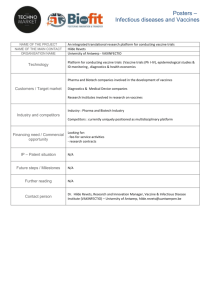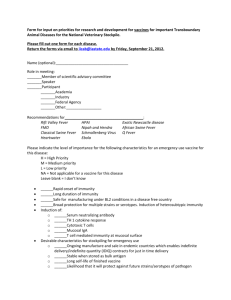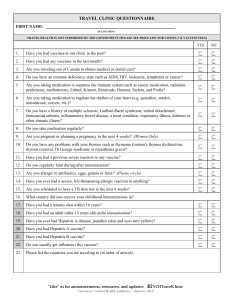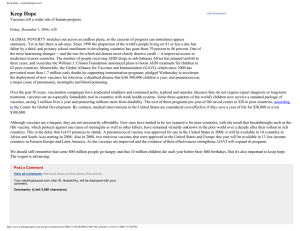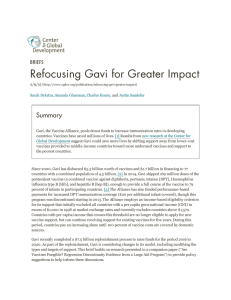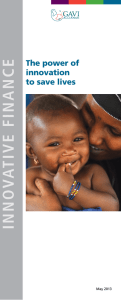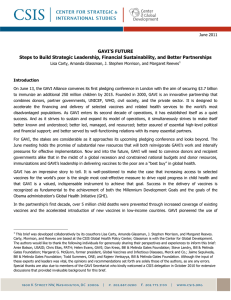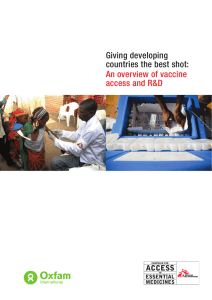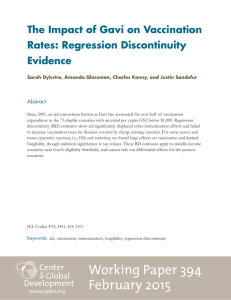The Areas of Study of the Three Teams can best be demonstrated by
advertisement
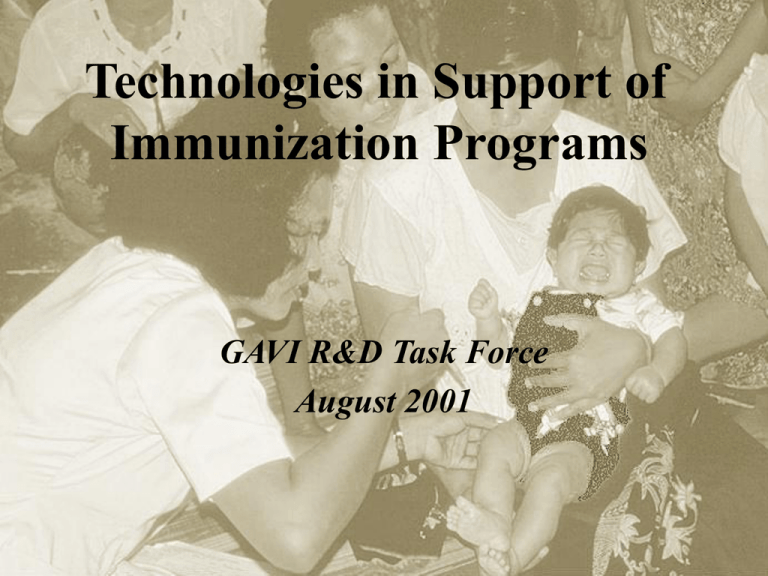
Technologies in Support of Immunization Programs GAVI R&D Task Force August 2001 GAVI R&D Task Force • The Task Force has been asked to select three technologies or categories of technology (not including new vaccines) that could have a major impact on immunization programs in the short (less than 5 years) or longer term (less than 10 years). • Input from Technet and SIGN members is requested in the selection of these technologies. Challenges in Immunization • • • • • • • Unsafe administration Wasted vaccine Spoiled vaccine Additional vaccines Decaying cold chain Poor infrastructure Outreach - the most difficult ‘last mile’ • • • • • • Poor management Wars and conflicts HIV/AIDS Hostile environments Resistance to change Lack of disease burden data GAVI R&D Task Force Three Teams Safety : Hardware Solutions •Prevent contamination •Prevent syringe re-use •Prevent heat damage •Prevent freezing •Safe disposal •Reduce wastage •Simplify systems, e.g. Self-contained, unit-dose administration systems Access, Management & Operations: Operational & Field Research & ICT solutions •Coverage •Management systems •Logistics •Management efficiency •Surveillance research Vaccine Formulation & Process Solutions •Sugar/Glass stabilisers •Reduce number of contacts -adjuvants -combinations • Formulations for alternative routes of administration Team Members (* Coordinator) Safety : Hardware Solutions Michael Free* Gordon Larsen Umit Kartoglu Bruce Weniger Ticky Raubenheimer Rudolph Cumming Punnee PitisuttithumJohn John Lloyd Access, Management & Operations: Op & Field & ICT solutions To be selected* Steve Landry Deborah Lans Hans Everts Robert Steinglass Soren Spanner Serge Ganivet Souleymane Kone Vaccine Formulation & Process Solutions Gordon Dougan* Reinhard Gluck Richard Strugnell Peter Carrasco (R. Kerry) (Rip Ballou) GAVI Survey (41 responses) Short Term • • • • • Improved management and tracking systems in the field Temperature stability technologies Combination vaccines Fix cold chain Monodose/self-contained unit-dose administration`systems (SCUDAS) • Sharps management Longer Term • Non-invasive administration · More Temperature stability • More combination vaccines Focus for Technology • • • • Safe and effective vaccines Safe administration Vaccine accessibility System efficiency Assuring Safe and Effective Vaccines at Point of Administration • No heat damage – Vaccine vial monitors (VVMs) – Fail-safe refrigeration – Ice-free cooling – Vaccine stability • No freezing damage – Fail-safe refrigeration – Freeze indicators • No contamination – ‘Monodose’ – Self-contained unit dose administration systems (SCUDAS) – Auto-disable reconstitution syringes – Auto-reconstitution Assuring Safe Administration • Assuring Sterile Injections – Auto-disable Syringes – Heat re-enabled sterilizable syringes • Self-contained Unit Dose Administration Systems ( SCUDAS, e.g. Uniject, Oral, Transdermal, Nasal dispenser etc.) • Preventing Collateral Sharps Injury – – – – – Needle-free administration Needle extraction (‘defanging’) Low capacity waste destruction systems Anti-stick devices Waste collection infrastructure Increasing Vaccine Accessibility • Adequate and timely delivery of supplies – Outsourced transport and logistics systems – IT for logistics management information – Freight tracking technologies • Assured availability of means of administration – ‘Bundling’ of indispensable commodities – SCUDAS – Adequate storage capacity – Some vaccine (with VVM) at ambient temp. – More frequent deliveries – High-efficiency solar refrigeration • Adequate outreach capacity – Adapted motorcycles, ATVs or boats – Ice-free cooling systems Achieving System Efficiency • Fewer administrations • Reduced cold chain dependency • No vaccine wastage • Simplified logistics • Reduced training burden • Minimum equipment down time Status of Technologies R&D (5-10 years) • Alternative thermostability technologies • Auto-reconstitution • Non-invasive SCUDAS • Multivalent vaccines Applications Development (1-7 years) • • • • Glassification drying Injection SCUDAS Reconstitution ADs Adapted sharps disposal solutions Status of Technologies (continued) Validation (1-3 years) Roll Out (0-3 years) • • • • • Monodose vials • Injection SCUDAS HBV,TT • VVMs -all vaccines • AD syringes for routine • Outsourced transport • Bundling of ADs and waste solutions • Multivalent vaccines High-efficiency fridge Ice-free cooling Outsourced logistics Out-of-the-cold chain protocols • Multi-dose jet injectors (next generation)

